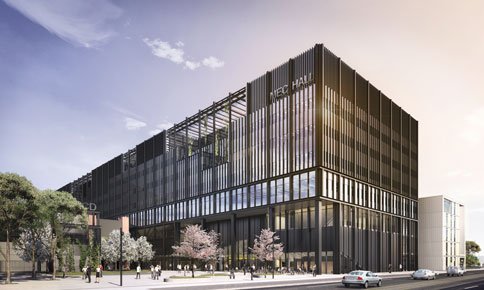DELFT, The Netherlands (June 3, 2016)—The University of Manchester has received planning permission from Manchester City Council to create a £350 million ($507.7 million) engineering campus designed by Dutch architecture practice Mecanoo. The new engineering campus will be a Manchester landmark, celebrating engineering within the world’s first modern city.
Announced last year, the Manchester Engineering Campus Development (MECD) will be one of the largest, single construction projects ever undertaken by a higher education institution in the United Kingdom. The development will transform the way in which the university educates future engineers with inspiring, modern facilities. At 195 meters (about 640 feet) long, the development’s main building—MEC Hall—could easily accommodate Manchester’s tallest building, Beetham Tower, laid sideways.
The development, due to be completed in 2020, is part of the university’s campus master plan to create a world-leading campus. This flagship project will bring together a multidisciplinary engineering and scientific community and consolidate the university’s student campus around Oxford Road. The new campus will heighten the visibility and accessibility of the university’s engineering and applied science activity, and facilitate strong engagement with industry, local schools and the wider public.

The Manchester Engineering Campus Development. (Courtesy of Mecanoo)
Francesco Veenstra, Partner at Mecanoo and Design Team Leader for MECD, said, “Integrating architecture, interior and landscape, we have designed a campus that will deliver a first-class teaching and research environment which will assist the University of Manchester’s ambition in becoming one of the top 25 research universities in the world. … The building can be envisioned as an engine: spawning a wide range of research and teaching activities and to take place with a high level of flexibility and adaptability for future change.”
Professor Martin Schröder, Vice President and Dean of the Faculty of Engineering and Physical Sciences at the university, said, “We will train the engineers of the future and discover and apply new knowledge to help industry and society to increase wealth and employment and to overcome global challenges of climate change, finite natural resources and changing world markets.”
Once complete, MECD will become home to the university’s four engineering schools and two research institutes from the Faculty of Engineering and Physical Sciences. It will include 70,590 square meters (759,824 square feet) of modern teaching spaces and facilities that reflect the changing demands of students and staff for mobile and flexible working. Cutting-edge technologies will enable students across all disciplines to engage with new modes of teaching.
Demolition on the site is currently underway and main construction works are scheduled to begin later this year.

